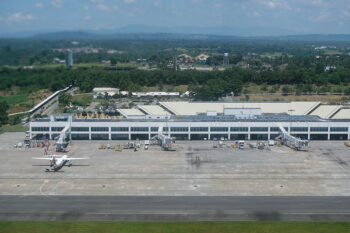
(Tribute delivered by Dr. Leopoldo J. Vega, former Health Undersecretary and former chief of the Southern Philippines Medical Center on 22 May 2023, the last night of the wake for Dr. Jose ‘Ting’ M. Tiongco, at the Cosmopolitan Funeral Homes along Cabaguio in Davao City)
Farewell, Boss Ting, you will always be remembered in the deepest recesses of our hearts.
You know, he never liked being called “Boss Ting” because he would say to me “Bong, we are not a Mafia organization here. You should not call me Boss.” But I told him, this is a term of endearment. This is a term of how we respect persons. And he agreed. But he really didn’t like to be called “Boss.”
Tonight, I want you to step into the dreams and visions of this man, Boss Ting, and how in his lifetime, he was able to realize those dreams and visions.
I was very fortunate in my early years as a new resident – I was a new graduate of medicine – to be under the chairmanship of Dr. Ting, as a general surgeon in training.
He had a vision that in order for access and equity for specialized procedures like surgery, he wanted to propagate surgery as a base. For this was one of specialties at that time that was hard to pursue and … expensive to begin with.
He started off this training program. He was very demanding of time, he was very demanding in terms of academics. And he was always telling us that surgery is both an art and a science. It’s neither art nor science but both.
Because of these demands that he had, he was able to multiply through the seniors that I had who passed the diplomate boards and became certified and qualified doctors. And that was the start of the seeds.
From nine residents at that time, they are now close to 70 in all specialties, and they have propagated themselves in different areas in Mindanao. In our conference room before, we had a map of Mindanao and he would guide us — where surgeons are needed, where specialty is needed.
Today, I’m proud to say, that in Mindanao alone, we have many more certified surgeons — not just in general surgery but in specialties — practicing the art and science of surgery. And he saw this realization.
He had a vision that he kept on telling me from that time that we were in training, because training for us in the early years was both a training in the operating rooms and in the streets. The streets because we would always ask: “Why? Why don’t we have medicines? Why don’t we have these resources with us to help out our very poor patients?”
The ‘whys’ and ‘why nots’ were there. And that paved the way for most of us to move towards health activism because we all knew that we cannot just be doctors or specialists but we must be able to provide service to those who are in deep need, especially the poor and the marginalized. This taught us compassion, this taught us humility in terms of providing our services.
And the other vision that he kept on telling me, he would say: “We have to improve this institution” in Davao Medical Center (DMC) that time. It can’t be always like this, why we lacked so much, not just in terms of the infrastructure but almost all of the services. And he said to me, “One day.” You know, because he wasn’t practicing surgery at that time, and he was full of doing organization work … and he was saying: “There has to be a time when you will find yourself not doing surgery.” And I could not believe it because I was in the middle of a good practice and he said it to me.
But after that I realized, when I took on the reins of a managerial position in a public institution, I realized what he said. He said: “for you to be very effective in public service or in service in general, you must be like a priest.” I didn’t understand it at that time. Soon I realized that when a priest gives the general blessing to everybody after the mass, it’s for everyone. Doing surgery, appendectomies, thyroidectomies or open heart surgeries — is a one-on-one basis and you cannot keep a bigger crowd … And that’s the reason why I stopped doing surgery when I took the managerial position. And I focused on how best we can improve in DMC and this is what it is now. And he was so proud.
When I took him there and I told him, this is what you dreamt of, this is what you really wanted to start and want to give to the public — institutions that can give specialty cares. And this is the reason why he helped those institutions so that a poor person who has a heart problem or a cancer who needs radiotherapy, doesn’t have to go to Cebu, Visayas or in Manila, because they don’t have the wherewithal of resources.
And he saw this vision and to top it all, I named one of the conference rooms under his name — the Jose Tiongco Hall — and he really disagreed with me because he said, “Bong, I am not dead. Why are you giving me this hall under my name. It looks like in a memorial.” “No, it is not,” I said, “this is actually for you. To remind you of your dreams, to remind you of the things we did here in this institution, multiplying the seeds…”
Eventually, when we started off with private practice and there were so many of us moving towards the private sector, he envisioned to come up with a hospital which was different. A private hospital which is also public. It was a cooperative hospital. Meaning to say, that it broadens the ownership and actually can be easily accessed by the poor and the doctors themselves. That was the start of Medical Mission. That was the start because he wanted to give each and everyone of us a place in the sun for private practice.
But he dreamt big. He dreamt and said, “You cannot just run one institution here in Davao. We need to multiply this institution. We need to come up with chapters all over the Philippines.” And I was a witness to those times when we would travel and do organization work.
It was hard. It was really one of dedication. But he was able to plant the seeds of cooperativism in 50 chapters at a certain time in the Philippines. And he even went beyond it. He wanted to consolidate and network all of these primary chapters in one organization. That was far beyond what Ayala, what MVP is doing now, doing networks in primary and secondary hospitals. Ting was far ahead. He was really a man out in the future. Sometimes you have to understand him, what he thinks and what he believes.
He was able to do that, consolidate and network and make sure that all of these chapters will move as a system because it was the system that actively made it very hard for health. You know right now, there is a dysfunctional health system in the local government and in the central government. That is the health system that we have. And we opted for this alternative, hoping that this would be mainstreamed in the end.
It was his dream. He was able to fully realize it.
Ting was a visionary. His thoughts were sometimes incomprehensible in the present times. But you have to understand how he thinks. He was, as he would say always to me, ‘I am a creature of the Jesuits.’ Jesuits, meaning, he was really a man for others.
And he fought. And he did. We lost a good man.
And we hope that his dreams, his visions won’t end.
Farewell, Chief.
(Dr. Leopoldo J. Vega was chief of the Davao Medical Center / Southern Philippines Medical Center from 2008 until he was named Health Undersecretary in June 2020. He was chair of the board of the Medical Mission Group Hospitals and Health Services Cooperative in Davao City when the country’s first cooperative hospital was inaugurated).







